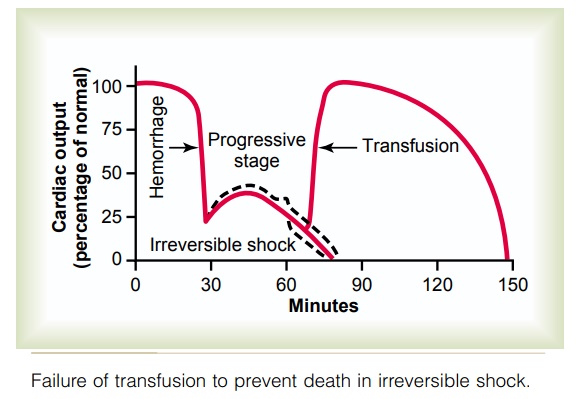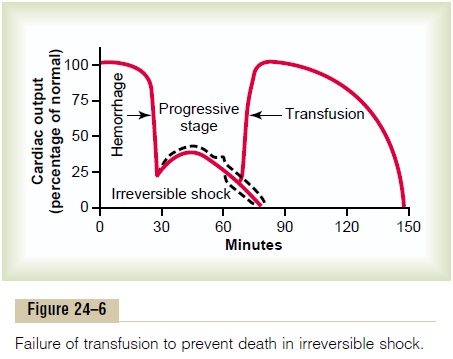Chapter: Medical Physiology: Circulatory Shock and Physiology of Its Treatment
Irreversible Shock

Irreversible Shock
After shock has progressed to a certain stage, transfusion or any other type of therapy becomes incapable of saving the person’s life. The person is then said to be in the irreversible stage of shock. Ironically, even in this irreversible stage, therapy can, on rare occasions, return the arterial pressure and even the cardiac output to normal or near normal for short periods, but the circulatory system nevertheless continues to dete-riorate, and death ensues in another few minutes to few hours.
Figure 24–6 demonstrates this effect, showing that transfusion during the irreversible stage can some-times cause the cardiac output (as well as the arterial pressure) to return to normal. However, the cardiac output soon begins to fall again, and subsequent trans-fusions have less and less effect. By this time, multiple deteriorative changes have occurred in the muscle cells of the heart that may not necessarily affect

the heart’s immediate ability to pump blood but, over a long period, depress heart pumping enough to cause death. Beyond a certain point, so much tissue damage has occurred, so many destructive enzymes have been released into the body fluids, so much acidosis has developed, and so many other destructive factors are now in progress that even a normal cardiac output for a few minutes cannot reverse the continuing deterio-ration. Therefore, in severe shock, a stage is eventually reached at which the person will die even though vig-orous therapy might still return the cardiac output to normal for short periods.
Depletion of Cellular High-Energy Phosphate Reserves in Irreversible Shock. The high-energy phosphate reservesin the tissues of the body, especially in the liver and the heart, are greatly diminished in severe degrees of shock. Essentially all the creatine phosphate has been degraded, and almost all the adenosine triphosphate has downgraded to adenosine diphosphate, adenosinemonophosphate, and, eventually, adenosine. Thenmuch of this adenosine diffuses out of the cells into the circulating blood and is converted into uric acid, a substance that cannot re-enter the cells to reconstitute the adenosine phosphate system. New adenosine can be synthesized at a rate of only about 2 per cent of the normal cellular amount an hour, meaning that once the high-energy phosphate stores of the cells are depleted, they are difficult to replenish.
Thus, one of the most devastating end results of deterioration in shock, and the one that is perhaps most significant for development of the final state of irreversibility, is this cellular depletion of these high-energy compounds.
Related Topics